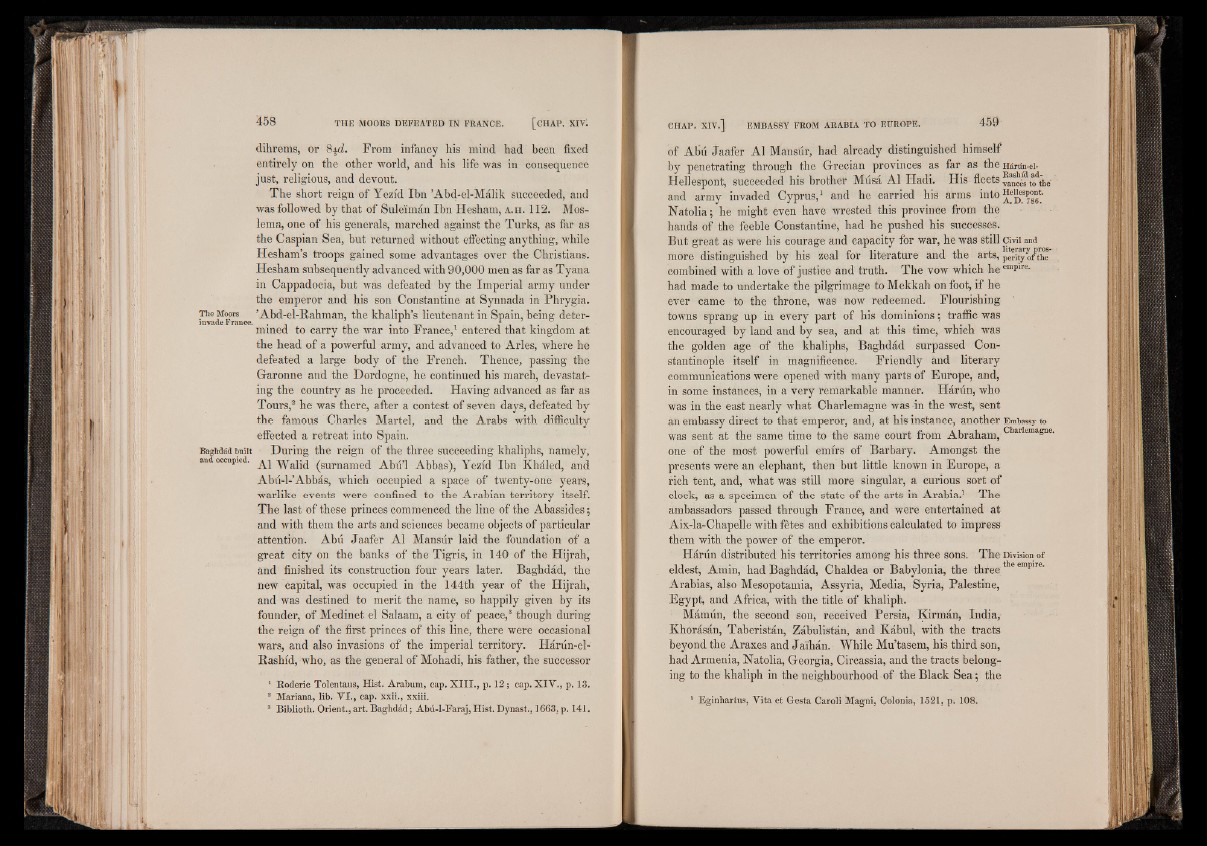
The Moors
invade France.
Baghdad bnilt
and occupied.
dihrems, or 8-iri. From infancy his mind had been fixed
entirely on the other world, and his life was in consequence
just, religious, and devout.
The short reign of Yezid Ibn ’Abd-el-Malik succeeded, and
was followed by that of Suleïmân Ibn Hesham, a . h . 1 1 2 . Mos-
lema, one of his generals, marched against the Turks, as far as
the Caspian Sea, but returned without effecting anything, while
Hesham’s troops gained some advantages over the Christians.
Hesham subsequently advanced with 90,000 men as far as Tyana
in Cappadocia, but was defeated by the Imperial army under
the emperor and his son Constantine at Synnada in Phrygia.
’Abd-el-Rahman, the khaliph’s lieutenant in Spain, being determined
to carry the war into France,1 entered that kingdom at
the head of a powerful army, and advanced to Arles, where he
defeated a large body of the French. Thence, passing the
Garonne and the Dordogne, he continued his march, devastating
the country as he proceeded. Having advanced as far as
Tours,2 he was there, after a contest of seven days, defeated by
the famous Charles Martel, and the Arabs with difficulty
effected a retreat into Spain.
During the reign of the three succeeding khaliphs, namely,
A1 Walid (surnamed Abu’l Abbas), Yezid Ibn Khaled, and
Abu-l-’Abbas, which occupied a space of twenty-one years,
warlike events were confined to the Arabian territory itself.
The last of these princes commenced the line of the Abassides ;
and with them the arts and sciences became objects of particular
attention. Abu Jaafer A1 Mansur laid the foundation of a
great city on the banks of the Tigris, in 140 of the Hijrah,
and finished its construction four years later. Baghdad, the
new capital, was occupied in the 144th year of the Hijrah,
and was destined to merit the name, so happily given by its
founder, of Medinet el Salaam, a city of peace,3 though during
the reign of the first princes of this line, there were occasional
wars, and also invasions of the imperial territory. Harun-el-
Kashid, who, as the general of Mohadi, his father, the successor
1 Roderic Tolentaus, Hist. Arabum, cap. X I I I ., p. 12 ; cap. X IV ., p. 13.
8 Mariana, lib. V I ., cap. xxii., xxiii.
3 Biblioth. Orient., art. Baghdad ; Abü-1-Faraj, Hist. Dynast., 1663, p. 141.
of Abu Jaafer A1 Mansur, had already distinguished himself
by penetrating through the Grecian provinces as far as the HSnin-ei-
Hellespont, succeeded his brother Musa A1 Hadi. His fleets ^nceduithe'
and army invaded Cyprus,1 and he carried his arms into
Natolia; he might even have wrested this province from the
hands of the feeble Constantine, had he pushed his successes.
But great as were his courage and capacity for war, he was still Civil and
more distinguished by his zeal for literature and the arts, perity o /th e
combined with a love of justice and truth. The vow which he emPire-
had made to undertake the pilgrimage to Mekkah on foot, if he
ever came to the throne, was now redeemed. Flourishing
towns sprang up in every part of his dominions; traffic was
encouraged by land and by sea, and at this time, which was
the golden age of the khaliphs, Baghdad surpassed Constantinople
itself in magnificence. Friendly and literary
communications were opened with many parts of Europe, and,
in some instances, in a very remarkable manner. Harun, who
was in the east nearly what Charlemagne was in the west, sent
an embassy direct to that emperor, and, at his instance, another Embassy to
was sent at the same time to the same court from Abraham, Charlemasne-
one of the most powerful emirs of Bafbary. Amongst the
presents were an elephant, then but little known in Europe, a
rich tent, and, what was still more singular, a curious sort of
clock, as a specimen of the state of the arts in Arabia.1 The
ambassadors passed through France, and were entertained at
Aix-la-Chapelle with fetes and exhibitions calculated to impress
them with the power of the emperor.
Harun distributed his territories among his three sons. The Division of
eldest, Amin, had Baghdad, Chaldea or Babylonia, the threethe empire-
Arabias, also Mesopotamia, Assyria, Media, Syria, Palestine,
Egypt, and Africa, with the title of khaliph.
Mamun, the second son, received Persia, Kirman, India,
Khorasan, Taberistan, Zabulistan, and Kabul, with the tracts
beyond the Araxes and Ja'ihan. While Mu’tasem, his third son,
had Armenia, Natolia, Georgia, Circassia, and the tracts belonging
to the khaliph in the neighbourhood of the Black Sea; the
1 Eginhartus, Vita et Gesta Caroli Magni, Colonia, 1521, p. 108.